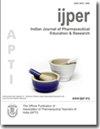In vitro and in silico Protective Effects of Ascorbic Acid on Nicotine-treated Human Erythrocytes (Preliminary Studies)
IF 0.8
4区 医学
Q3 EDUCATION, SCIENTIFIC DISCIPLINES
Indian Journal of Pharmaceutical Education and Research
Pub Date : 2023-10-04
DOI:10.5530/ijper.57.4.125
引用次数: 0
Abstract
Abstract: Objectives: Nicotine is one of the most addictive naturally occurring drugs and is commonly found in tobacco products. Tobacco products are one of the most common causes of lung and oral cancer all over the world. As the main organ in contact with nicotine is the blood, our aim in the present study was to confirm its effect on the blood, We also studied the protective role of ascorbic acid on nicotine toxicity. Materials and Methods: Different blood toxicity study-related experiments such as Superoxide Dismutase (SOD), catalase, and total antioxidant capacity in erythrocytes were carried out using in vitro and in silico methods. Results and Conclusion: The results demonstrated that nicotine harms red blood cells in the lysis assay as well as the formation of clots in nicotine-treated samples in the blood clotting analysis. Also, the in silico method proved the validity of the in vitro results. Our research shows that ascorbic acid has protective effects on human blood. It was found that ascorbic acid increases SOD, catalase, and total antioxidant activity. Ascorbic acid also reduced the damage caused by nicotine to Red Blood Cells (RBCs) in the lysis assay, and it showed high protection from the formation of clots that formed when treating the samples with nicotine. The results indicate that the antioxidant ascorbic acid can protect against nicotine-induced hemological damage. Keywords: Nicotine, in silico, in vitro, Ascorbic acid, Erythrocytes, Antioxidant抗坏血酸对尼古丁处理的人红细胞的体外和体内保护作用(初步研究)
摘要:目的:尼古丁是最容易上瘾的天然药物之一,普遍存在于烟草制品中。烟草制品是全世界肺癌和口腔癌最常见的原因之一。由于与尼古丁接触的主要器官是血液,我们本研究的目的是确认其对血液的作用,我们还研究了抗坏血酸对尼古丁毒性的保护作用。材料与方法:采用体外和室内两种方法,对红细胞超氧化物歧化酶(SOD)、过氧化氢酶(过氧化氢酶)、总抗氧化能力等血液毒性相关的实验进行了研究。结果与结论:实验结果表明,在溶血实验中,尼古丁对红细胞有损害;在凝血实验中,尼古丁对经尼古丁处理的样品有损害。此外,该方法证明了体外实验结果的有效性。我们的研究表明抗坏血酸对人体血液有保护作用。研究发现,抗坏血酸能提高SOD、过氧化氢酶和总抗氧化活性。在裂解实验中,抗坏血酸还减少了尼古丁对红细胞(rbc)造成的损伤,并且在用尼古丁处理样品时,抗坏血酸显示出对血栓形成的高度保护。结果表明抗坏血酸对尼古丁引起的血液系统损伤具有保护作用。关键词:尼古丁,硅,体外,抗坏血酸,红细胞,抗氧化剂
本文章由计算机程序翻译,如有差异,请以英文原文为准。
求助全文
约1分钟内获得全文
求助全文
来源期刊
CiteScore
1.40
自引率
0.00%
发文量
227
审稿时长
>12 weeks
期刊介绍:
The official journal of Association of Pharmaceutical Teachers of India (APTI) and is being published since 1967. IJPER, a quarterly publication devoted to publish reviews and research articles in pharmacy and the related disciplines of Pharmaceutical education. It mainly covers the articles of special interest, covering the areas of Pharmaceutical research, teaching and learning, laboratory innovations, education technology, curriculum design, examination reforms, training and other related issues. It encourages debates and discussions on the issues of vital importance to Pharmaceutical education and research. The goal of the journal is to provide the quality publications and publish most important research and review articles in the field of drug development and pharmaceutical education. It is circulated and referred by more than 6000 teachers, 40,000 students and over 1000 professionals working in Pharmaceutical industries, Regulatory departments, hospitals etc.

 求助内容:
求助内容: 应助结果提醒方式:
应助结果提醒方式:


